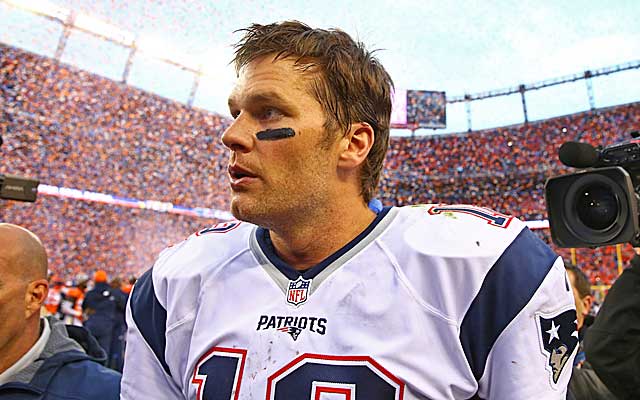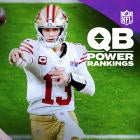The Second Circuit United States Court of Appeals dropped the hammer back on Tom Brady and the Patriots Monday morning, reinstating the four-game suspension levied by the NFL against Brady from the Deflategate investigation.
From the ruling, filed Monday morning:
We hold that the Commissioner properly exercised his broad discretion under the collective bargaining agreement and that his procedural rulings were properly grounded in that agreement and did not deprive Brady of fundamental fairness. Accordingly, we REVERSE the judgment of the district court and REMAND with instructions to confirm the award.
Brady is suspended the first four games of the 2016 NFL season as a result.
Here are seven more things to know about the decision:
Do the judges think Brady deflated the footballs?
Nope! They don't even care about the whole Deflategate thing, in fact. The judges only care about the process involved with the way the NFL and the NFLPA negotiated the discipline process. Roger Goodell is judge, jury and executioner, which is absurd, but it's the way things are set up in the CBA.
The judges even called Goodell's power "unorthodox" but also called it "mutually satisfactory" because it was negotiated by the two parties.
The Commissioner was authorized to impose discipline for, among other things, “conduct detrimental to the integrity of, or public confidence, in the game of professional football.” In their collective bargaining agreement, the players and the League mutually decided many years ago that the Commissioner should investigate possible rule violations, should impose appropriate sanctions, and may preside at arbitrations challenging his discipline. Although this tripartite regime may appear somewhat unorthodox, it is the regime bargained for and agreed upon by the parties, which we can only presume they determined was mutually satisfactory.
The NFL and NFLPA both issued statements after the decision reflecting their arguments in the case over Goodell's disciplinary power, per the CBA.
"We are pleased the United States Court of Appeals for the Second Circuit ruled today that the Commissioner properly exercised his authority under the collective bargaining agreement to act in cases involving the integrity of the game," the NFL wrote. "That authority has been recognized by many courts and has been expressly incorporated into every collective bargaining agreement between the NFL and NFLPA for the past 40 years."
From the NFLPA: "The NFLPA is disappointed in the decision by the Second Circuit. We fought Roger Goodell's suspension of Tom Brady because we know he did not serve as a fair arbitrator and that players' rights were violated under our collective bargaining agreement. Our Union will carefully review the decision, consider all of our options and continue to fight for players' rights and for the integrity of the game."
What about the NFLPA arguments?
The court shot them down aggressively. Mentioning all of "Lack of Adequate Notice," "exclusion of testimony" and "denial of access" -- the reasons why the district court had Brady's back.
We conclude that each of these grounds is insufficient to warrant vacatur and that none of the Association’s remaining arguments have merit.
What about that steroid comparison?
The Appeals Court took an interesting approach to comparison that Roger Goodell made about Deflategate in which Goodell stated deflating footballs was akin to using PEDs:
We are not troubled by the Commissioner’s analogy. If deference means anything, it means that the arbitrator is entitled to generous latitude in phrasing his conclusions.
Did all the judges agree with the NFL?
Nope. There was a dissenting opinion from Judge Katzmann, who actually blasted Goodell for abuse of his power and his "own brand of industrial justice."
Additionally, on a more fundamental level, I am troubled by the Commissioner's decision to uphold the unprecedented four-game suspension. The Commissioner failed to even consider a highly relevant alternative penalty and relied, instead, on an inapt analogy to the League's steroid policy. This deficiency, especially when viewed in combination with the shifting rationale for Brady's discipline, leaves me to conclude that the Commissioner's decision reflected "his own brand of industrial justice."
What games will Brady miss?
The Patriots play the Cardinals, Dolphins, Texans and Bills during the first four weeks of the 2016 NFL season. Just like last year, the Pats are scheduled to kick things off in primetime. Unlike last year, the Pats aren't defending a Super Bowl. Instead they open up on Sunday night at Arizona in what is suddenly a less attractive game from a football-watching standpoint, but a potential ratings monster because, you know, Deflategate.
Did Tom Brady see this coming?
He definitely saw the possibility. Remember when Brady re-worked his contract this offseason? During the deal, the Patriots and Brady set it up so he wouldn't lose millions of dollars if he was suspended for four games, but would instead lose just about $235,000.
So what's next?
Brady and Co. are running out of legal options. But you have to imagine that Tom Brady isn't going to give up on this fight just yet. Brady can petition for a rehearing from the entire Second Circuit or he can petition to the Supreme Court. Both options are on the table as it's not mutually exclusive to pick which direction you want to go.
According to Tom Gies, a management side labor lawyer with Crowell & Moring who is not involved in the case, Brady has three options under local court rules:
1) Ask the panel that decided the case for rehearing. That must be filed within 14 days.
2) A petition for rehearing en banc, also due in 14 days.
3) File a petition certiorari with the Supreme Court, a step that can also be taken after pursuing steps 1 or step 2.






















